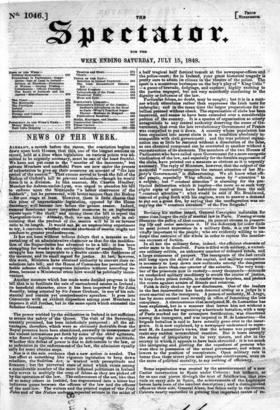Revising his earlier intent, General Cavaignac maintains for some time
longer the rule of martial law in Paris. Passing events illustrate the policy of that course; its present success in preserv- ing life and order sanctions it. If the deference for order finds its most potent expression in a military form, it is not the leas vitally important to the people; who are evidently willing to un- dergo that restraint of the whole in order to repress the murder- ous excesses of faction.
In all but the military form, indeed, the efficient elements of order seem to be dissolved. Paris is filled with soldiery, a victori- ous military militia, an unknown number of defeated rebels, and a large concourse of paupers. The insurgents of the last revolt still hang upon the skirts of the capital, and military occupation is necessary to keep down new outbreaks among the dangerous classes in more than one quarter of the suburbs. The very num- ber of the prisoners now in custody—many thousands—demands an unchecked military machinery to secure the course of justice, to keep down prison revolts, to render rescue hopeless, and protect the courts against armies of friends and relatives. Faith is daily shaken by new disclosures. One of the leaders in the last insurrection bus been detected sitting as a judge in a court-martial on the insurgents. A person of authority, M. Arago, has by name accused men recently in office of fomenting the late i
conspiracy. A circumstance that inculpated M. de Lamartine has been explained, but in a manner that leaves him not without a stain. A scheme for organizing a barricade battalion, with a map of Paris marked out for extempore fortification, was discovered among the insurgents, and was imputed to M. de Lamartine—the brigade battalion is said to have actually gone over to the insur- gents. It is now explained, by a newspaper understood to repre- sent M. de Lamartine's views, that the scheme was prepared to resist any sudden monarchical reaction. But it bears strongly the stamp of irregularity in its very nature, and also in the secrecy in which it appears to have been shrouded : it is too much like intriguing and plotting for the expedient of persons who were then in possession of the actual government, and whom it lowers to the position of conspirators. Open military rule is better than these secret plots and irregular contrivances, even on the score of political morality, to say nothing of efficiency.


























